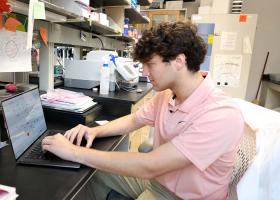
Biomedical engineering student Graham Lenert (B.S. '26) started volunteering as an undergraduate researcher in Mete Civelek's Lab during his second year at the University of Virginia. In the lab, Graham’s day-to-day research mentor is graduate student Noah Perry (Ph.D. '25).
The team is investigating how heart attacks are experienced differently in males and females. They have identified a group of genes in female bodies that are expressed in inflammatory states and could explain how women experience heart attacks differently than men.
To share their discovery with the wider scientific world, they turned to the Milton Adams Research Fellowship, a competitive award that helps graduate-undergraduate student research teams disseminate their research. For example, the grant might cover the costs associated with submitting a manuscript to a scientific journal or traveling to a national conference to present a poster. In this particular instance, they may be used to travel to Taiwan!
Here is a progress report from Graham.
January 2025
We’ve spent the last year investigating sex-specific genetic regulatory mechanisms that drive atherosclerosis. We’ve generated Gene Regulatory Networks from RNA-Seq data to determine key drivers in plaque formation in response to vascular injury. After we isolated key drivers, we performed Gene Set Enrichment Analysis to generate a hypothesis regarding the mechanism and phenotype for modules of genes. One gene, MYH9, really stood out to us, and we chose to further investigate MYH9's role in atherosclerosis. We found that MYH9 plays a role in stabilizing plaque, which may reduce risk of symptomatic heart issues.
We've collaborated with groups from several countries to corroborate our hypothesis and found support for a MYH9 dependent sexual dimorphism at the transcriptomic, proteomic and in vivo patient levels. For instance, we found support for MYH9 being linked to fibrous phenotypes via plaque proteomics and plaque histology. We also worked with collaborators to analyze single cell RNA-seq data to validate our sex-biased networks.
MYH9 also seems to play an athero-protective role in males, but to a lesser degree. We hypothesize that this may be due to hormonal differences across the biological sexes, and the fact that an X-inactivation escape gene is the most tightly associated gene with MYH9.
As a result of our efforts, we've been drafting a manuscript that is nearly finished! We are currently finalizing figure details with collaborators and performing one last CRISPR experiment that may make the final paper. We hope to submit the paper for review later this spring.
A further opportunity has arisen from our work. We've been in contact with a physician-scientist at the National Taiwan University, and he has invited me to spend the summer abroad to conduct research in his lab. If it works out, I plan to use the Adams Fellowship award to help cover the costs associated with this exciting opportunity.
Thanks for the update, Graham!
MORE:
Graham's experience as a Dean's Summer Research Fellow
APPLY top the Milton Adams Research Fellowship